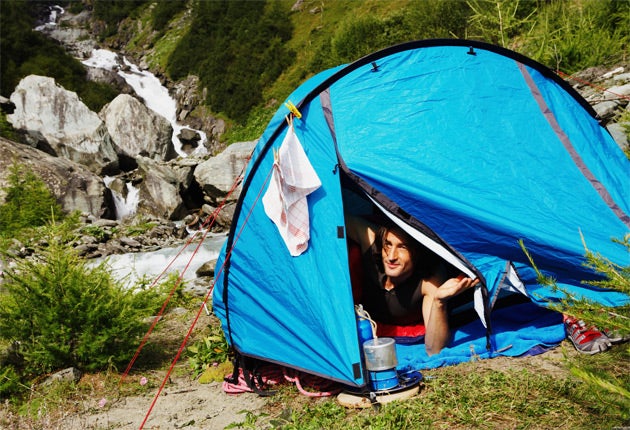A blagger's guide to travel: Simon Calder's no-cost holidays
Want to see the world – but feeling the pinch? You don't have to settle for staying put this summer.

Across the bleak landscape of decline that is travel publishing in 2009, one rare patch of sunshine lights on a clutch of new "green" guides. The one I have in my hand right now promises to illuminate us with "All you need to know to help you plan a holiday that's both great for you and good for the environment". But in its 120-page section titled "Way to Go" there is no mention of hitch-hiking. Thumbing a ride is the cleanest form of motorised travel on the planet, because it consumes trifling extra hydrocarbons and creates no future demand. And with an average of three empty seats in each vehicle on UK roads, picking up hitchers is good for your conscience, too.
In these tricky times, perhaps I should revive the hitch-hiking manuals popular(ish) in the 1970s, when the only feasible way for dishevelled youths to explore Europe and beyond was to stand by the side of an autoroute, autopista or autobahn and hope for the best. If only I had known I was saving the planet at the same time as saving cash; it could have cheered up many long hours outside Dijon or Dortmund, while the daylight dwindled at the same rate as my tobacco supply and the prospect of reaching Paris before midnight.
Those who preferred not to join the late unwashed in the layby had few other options for free travel. At the time, clandestine photocopied fare-dodgers' manuals circulated among students and football fans, explaining how to avoid paying British Rail fares that the less-well-off regarded as punitive.
Today, such subversive literature would not be worth the (stolen) paper it was printed on – partly because "revenue protection" is more effective, but mainly because of the rise of "nearly-free" travel. Anyone with an internet connection can source very cheap seats on many of the UK's railways. Whether you want to travel to the capital from Manchester (from £1 on Virgin) or from London to York (from £1.50 on Megatrainplus), a bit of advance planning can help you track down tickets below 1970s levels.
Hotels are doing well to fill three-quarters of their beds; usually, the average is closer to half. But they have now woken up to the idea that selling rooms for almost nothing (or barely more than "marginal cost") can be a good business strategy if it brings the punters in, spending money in the bar and breakfast room. Travelodge today launches another short-term sale, discounting "distressed inventory" – rooms in its budget hotels that will simply not sell at "rack rate" – for £9 a night.
All of which is excellent news for travellers, until you just have to go and/or stay somewhere at short notice – at which point the travel boot is on the other foot. Your needs become "distress purchases", and suppliers charge a fortune.
Happily there are plenty of ways to travel and stay absolutely free. For some of us, hitch-hiking has never gone away: getting from A to B, possibly via C, D and E, but in the comfort of a chauffeur-driven car. You can also source free accommodation when you hitch. In New Zealand, if I am out in the countryside with nowhere to stay, I simply start thumbing towards nightfall, confident that someone will stop, give me a lift and supply a sofa for the night.
"Couch-surfing" is this essence of human concern for the traveller, globalised and formalised with the help of the internet. The concept of offering or seeking somewhere to sleep in a stranger's home reached a significant milestone earlier this year, when the millionth participant signed up for couchsurfing.org. It is a brilliantly conceived realisation of the fact that travellers are good people, and as happy to welcome others into their home as they are to take up free accommodation.
But you cannot (yet) announce online "I'm in Paris, it's cold and dark, I have only a meagre supply of cash and it happens to be sterling, and I need somewhere to stay". When misfortune intervenes, you need an alternative – and in my experience that usually involves an airport. They tend to be warmer, drier, safer and more tolerant of unofficial overnighters than railway stations. In recent years I have slept well at Calgary, Malaga and Oslo airports, but less soundly at Manchester, when patrolling police interrupted my slumber to check my credentials. The excellent website sleepinginairports.net does not give Manchester airport a particularly good rating, though I admire the panache of the traveller who reports on the site that he managed to pitch his tent within 10 minutes' walk of Terminal 1.
"Wild camping" is the epitome of free accommodation, because it has no time limits and few geographical constraints. While some free travellers practise the art in the small park opposite the Old Vic in the heart of London, it is usually easier in the wilderness (though often restricted or banned in national parks). But it requires a tent, which has to be bought – and carried. The penniless globetrotter who prefers not to haul a home, and aspires to a little more luxury, should head for the mountain refuges such as those provided in the French Pyrenees. In the higher parts of the range, disused shepherd's huts and dilapidated cow sheds are pressed into service as overnight shelters, often with fireplaces and even rudimentary mattresses. Sleep is best when deep and cheap.
Subscribe to Independent Premium to bookmark this article
Want to bookmark your favourite articles and stories to read or reference later? Start your Independent Premium subscription today.

Join our commenting forum
Join thought-provoking conversations, follow other Independent readers and see their replies